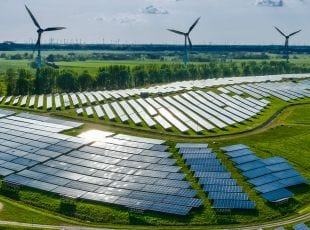Group positions and sector policies
As a bank, we finance many business activities, some of which pose real environmental, social and governance (ESG) challenges. This is why we have sector policies that define the criteria for our financing and investments in these sensitive areas.
In accordance with the United Nations Sustainable Development Goals, the Group aims to support its clients in the energy transition, the fight against deforestation and the safeguarding of local populations.
These public positions and sector policies apply to all our business lines, products and services, and in all countries in which we are located.
Supporting the environment
As a signatory of the United Nations Global Compact in 2003, BNP Paribas is gradually strengthening its environmental commitments and actions as part of its CSR (Corporate Social Responsibility) strategy to support its clients’ transition towards more sustainable practices. In May 2024, BNP Paribas updated the environmental framework that steers several Group policies.
Promoting the energy transition
Our “Coal-fired power generation” sector policy
Released for the first time in 2010, this sector policy has been updated regularly over the years to incorporate criteria that are more binding. Its latest commitment, made in May 2020, announced a full exit from thermal coal by 2030 in European Union and OECD countries and by 2040 in the rest of the world.
Our "Mining industry" policy
Mining is a source of GDP for many countries and also supplies basic elements to most economic sectors. Many ores are also key to the energy transition, for example in playing a predominant role in electric vehicles or wind and solar power. The Financing and Investment Policy governs BNP Paribas’ activities in the mining industry.
Our "Oil & Gas" sector policy
In 2017, BNP Paribas defined an initial financing and investment policy for this sector, focusing in particular on non-conventional oil and gas. The following year, BNP Paribas strengthened its restrictions and funding criteria in the particularly sensitive ecosystems of the Amazon and the Arctic, an area for which the Group adopted the definition of the Arctic Monitoring and Assessment Programme in 2022.
Our "Nuclear energy" sector policy
According to the International Atomic Energy Agency, nuclear power supplied 10% of electricity generated worldwide in 2023. Moreover, all of the IPCC’s “net zero” scenarios incorporate nuclear power into the projected energy mix. Through this policy, BNP Paribas wants to ensure that the projects that it helps finance are in compliance with global principles of monitoring and attenuating environmental and social impacts for the nuclear energy sector.
Combatting deforestation
Forests are not only the main global biodiversity reservoir, but they also play a primary role in sequestering carbon, thus actively contributing to combatting climate change.
In accordance with its environmental position and its actions to preserve natural capital, BNP Paribas has established three policies guiding its financing and investments in the sectors of palm oil, wood pulp and agriculture.
BNP Paribas’ global commitment to protecting forests has been recognised by the NGO Global Canopy, which for the last several years has ranked BNP Paribas among the most committed financial institutions on the subject in its Forest500 ranking.
in financing to companies helping to protect terrestrial and marine biodiversity as of the end of 2024
Our "Palm oil" sector policy
Since 2017, the palm oil policy has included an assessment of new palm oil plantations, based on the High Carbon Stock (HCS) approach to protect forests with high carbon stocks, making it one of the most advanced policies in the financial sector.
Our "Wood pulp" sector policy
As an important source of revenue for thousands of people, wood pulp production can also have environmental impacts, notably on deforestation. BNP Paribas’ wood pulp policy is mainly based on the standards of the Forest Stewardship Council (FSC) and the Programme for the Endorsement of Forest Certification Schemes (PEFC) to ensure the sustainable management of forests.
Our "Agriculture sector" policy
In February 2021, BNP Paribas incorporated new criteria into its agriculture policy to combat deforestation in Amazonia and the Cerrado. BNP Paribas expects its clients producing or buying beef or soy from Amazonia and the Cerrado in Brazil to have put in place a zero-deforestation strategy by end of 2025 and to demonstrate their progress in a transparent manner.
Preserving biodiversity and protecting the Ocean
The scientific community continues to warn that biodiversity and ecosystems are being degraded at an exceptional and alarming rate (IPBES, 2019). In 2021, BNP Paribas published its position on natural capital and biodiversity to affirm its commitment to preserving biodiversity through its financing and investments. This has been put into place through the inclusion of biodiversity criteria in financing and investment policies since 2012, an ongoing dialogue with clients in the most sensitive sectors, and the provision of products and services based on nature-based solutions.
In 2019, the Group also published its position on the Ocean to work with its clients to achieve the SDG 14 (“Aquatic Life”) for the conservation and sustainable exploitation of the Ocean.
Safeguarding human rights
BNP Paribas is committed to respecting human rights, as defined in the Universal Declaration of Human Rights of the United Nations. These rights serve as a reference for the Group in all its activities, in all the countries in which it operates, and in all the relationships it maintains with its stakeholders (employees, suppliers, clients and companies in which the Group invests, as well as populations potentially impacted by companies and projects financed by the Group). BNP Paribas’ approach to human rights is defined in the document “BNP Paribas and Human Rights”.
Since 2017, BNP Paribas has also pledged to no longer finance or invest in the tobacco sector, which the World Health Organization has identified as the number one cause of avoidable deaths.
of BNP Paribas' sector policies incorporate human rights criteria
Ensuring the security of the population
In accordance with the United Nations Guiding Principles on Business and Human Rights, BNP Paribas has developed a financing and investment policy specifically designed to govern transactions in the sectors of defence and security. While recognising each country’s right to defend its interests and protect its national security, this policy takes into account the risks that are specific to this sector.
Our "Defence and security sector" policy
The defence and security sector is essential to the protection of democracies and their citizens. BNP Paribas reaffirms its commitment to support the financing of companies in the defence sector, mainly within NATO countries, and particularly countries in Europe. The Group has developed a policy to oversee all its activities in relation to the defence and security industry.
Originally published in 2010 and last updated in 2025, BNP Paribas’ defence policy excludes the financing of weapons governed by major international agreements, such as antipersonnel mines or cluster bombs. In addition, this policy excludes any transaction related to the export of defence and security equipment to a country with which the transaction would pose a major human rights risk.
Goods exclusion list
As part of its sustainable development policy, BNP Paribas has drawn up a list of goods for which it excludes any transaction, due to the environmental or social risks they incur. This includes drift nets, asbestos fibres, tobacco and the production and trade of weapons excluded by international conventions.
View our goods exclusion list

